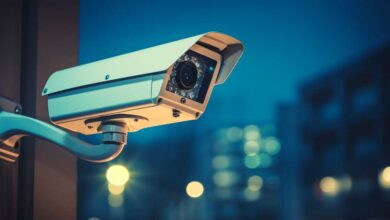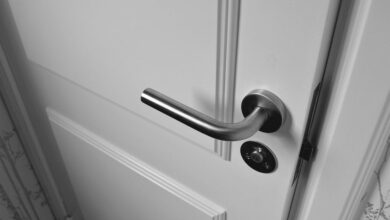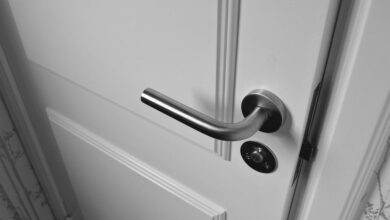Choosing The Best Smart Home Security System
KEY TAKEAWAYS
Adopting smart home security systems has become an essential approach for ensuring the safety and security of your home. This comprehensive guide will give you the knowledge and understanding when choosing the best smart home security system.
We’ll delve into what these systems are, their key features, and their pros and cons. We’ll also provide guidelines on choosing an optimal system, including factors such as system compatibility, installation, cost, and user reviews. Whether you’re a homeowner looking to upgrade your current system or a first-time buyer, this guide will equip you with the necessary information to make an informed decision.
Understanding Smart Home Security Systems
In the rapidly evolving world of technology, homeowners’ allure of smart home security systems is growing. These innovative systems offer more than just advanced security features; they deliver unparalleled control and convenience that traditional systems simply can’t match.
A smart home security system is a sophisticated solution that leverages intelligent, interconnected technology to safeguard your home. It operates on the principle of the Internet of Things (IoT), which allows devices to communicate over a shared network, such as your home’s Wi-Fi.
These systems typically include a range of components like smart locks, door/window sensors, security cameras, alarm systems, and often a central hub or control panel. Each component plays a unique role, but together, they work to deter, detect, and alert you to potential threats.
Smart home security systems’ remote monitoring and control capabilities are a standout feature. Through a smartphone app, you can view live footage from your security cameras, receive alerts when a sensor is triggered, activate or deactivate the system, and even lock or unlock doors from anywhere.
Key Features of a Smart Home Security System
When it comes to smart home security systems, the range of features they offer can significantly impact their performance. Here’s a rundown of the primary attributes you should be aware of:
-
Remote Monitoring: This feature allows homeowners to monitor their property from anywhere, often in real-time, using mobile or web-based applications.
-
Smart Locks: These innovative devices facilitate keyless entry via a smartphone app or code. Some even include biometric features like fingerprint recognition and can send alerts if doors are left unlocked.
-
Alarm Systems and Motion Sensors: These systems act when they detect unusual activity or intrusion, triggering alarms to deter intruders and alert homeowners or a monitoring service.
-
Security Cameras: These devices, suitable for indoor and outdoor use, offer surveillance capabilities. Many come with night vision and two-way audio features, allowing you to communicate with individuals at your door.
-
Door/Window Sensors: Typically magnetic, these sensors alert you when a door or window is opened or closed.
-
Integration Capabilities: Many smart home security systems can seamlessly integrate with other smart devices, such as voice assistants or smart lighting systems, creating a more connected and comprehensive home safety and convenience ecosystem.
-
Automation Sequences: These systems enable the creation of routines or sequences that are automatically triggered by specific events or times, like lights turning on when your car pulls into the driveway.
-
Customizability: The option to add more devices or upgrade your system as your needs evolve is a valuable feature.
Remember, the goal is to choose a system that fits your lifestyle and security needs. Not every feature will be necessary for every homeowner, so it’s crucial to identify your needs before deciding on the most important features.
The Pros and Cons of Smart Home Security Systems
Like any technology, smart home security systems have their own advantages and disadvantages. It’s important to consider these when deciding whether to invest in one.
|
PROS |
CONS |
|
|
When considering a smart home security system, balancing these pros and cons against your individual needs, budget, and comfort level with technology is essential.
Guidelines for Choosing an Optimal Smart Home Security System
Selecting the perfect smart home security system is a task that requires a thoughtful approach, taking into account your unique home environment, lifestyle preferences, and financial plan. In this segment, we will navigate through the essential elements that should be at the forefront of your selection process – system compatibility, installation intricacies, cost considerations, and the importance of user feedback.
System Compatibility and Installation
Ensure your chosen security system’s hardware and software mesh with your existing smart devices, like Alexa or Google Home. Check the communication protocol—be it Z-Wave, Zigbee, or Wi-Fi—for seamless integration. Assess the installation: some systems offer easy DIY setup, while others demand professional assistance, impacting cost. Choose based on comfort and budget
Assessing Cost and Value
In the journey to select the ideal smart home security system, balancing cost and value is essential. The price tag isn’t solely about the initial investment in the hardware. It also encompasses potential recurring expenses such as cloud storage, subscription fees, and supplementary services.
Smart home security systems range from basic models under $100 to premium systems that run into the thousands. Some may also necessitate a monthly fee for monitoring services or access to enhanced features.
When weighing cost, consider the value the system delivers:
-
Scalability: Does the system support expansion? Can you integrate more components in the future without a substantial upgrade?
-
Adaptability: Can the system seamlessly work with various devices and brands? Is it capable of adapting to technological advancements?
-
Service Quality: How dependable are the alert services? Is customer support readily available and responsive?
-
Peace of Mind: Ultimately, a smart home security system’s true worth is its tranquility. How effectively does your chosen system fulfill this need?
Remember, the best value isn’t necessarily synonymous with the cheapest system. It’s about obtaining the features and quality you require at a price you’re comfortable with. Therefore, consider a variety of factors, not just the price, when assessing cost and value.
Interpreting User Reviews and Ratings
User reviews and ratings are a treasure trove of information when selecting a smart home security system. They provide a glimpse into the experiences of actual users and the system’s performance. Look out for:
-
Product Performance: Does the product deliver as promised? Are users satisfied with its functionality?
-
Customer Support: Is the manufacturer’s customer support commendable? Are the support staff responsive and helpful?
-
Common Issues: Is there a recurring complaint among reviewers? Is it a minor inconvenience or a deal-breaker?
-
Review Trends: Has the rating improved or deteriorated over time? This could signal product enhancements or emerging issues.
Remember, no product is immune to negative reviews. The key is to ascertain whether the negative reviews highlight issues significant enough to sway your decision. Remember that your requirements might differ from the reviewers, so concentrate on reviews that discuss aspects of the product that are important to you.
Maintaining the Optimal Performance of Your Smart Home Security System
Once you’ve invested in a smart home security system, keeping it running smoothly is essential. This involves a combination of regular updates, troubleshooting common issues, and knowing when to call in the professionals.
By adhering to these maintenance practices, you can ensure your security system’s longevity, maintain high-security standards, and maximize the return on your investment.
Updates and Troubleshooting
Keeping your smart home security system up-to-date is critical to maintaining its optimal performance. Regular updates often bring software patches, bug fixes, and enhancements that keep your system functioning at its peak. Moreover, these updates help fortify your system against potential digital threats, ensuring robust security.
While most smart home systems will alert you when an update is available, it’s a good practice to manually check for updates periodically. This is particularly true for systems connected to your Wi-Fi, as updates may be necessary to align with changes in your router’s updates or your Internet Service Provider’s system updates.
Troubleshooting is another essential aspect of system maintenance. Understanding the common issues that may arise with your specific security system is important. Many manufacturers offer troubleshooting guides or have dedicated customer service teams to assist you with minor issues.
For example, if your system includes cameras, you may occasionally experience video feed disruptions. Understanding how to reset your cameras or check the internet connection can save you a lot of frustration. If your system includes smart locks, you may encounter issues related to battery replacement or signal range between your lock and hub. Addressing these issues, or knowing when to engage professional help, is key to maintaining your system’s optimal performance.
Remember that maintenance and troubleshooting aim not just to fix issues as they occur but to preempt potential problems and ensure your system always provides the best possible home security.
Engaging a Professional Locksmith
In the realm of smart home security system maintenance, there are instances where the expertise of a professional locksmith becomes invaluable. This is particularly true when dealing with intricate systems or when confronted with issues that surpass basic troubleshooting.
Locksmiths who have undergone professional training possess the necessary skills to install, repair, and maintain smart lock systems, an essential component of a smart home security system. They can guarantee that your locks are securely and accurately installed, thereby preserving the robustness of your home’s security defenses.
For instance, suppose your smart lock experiences a mechanical failure, software glitch, or physical damage. In that case, a locksmith’s technical acumen can swiftly rectify these issues, mitigating potential risks and ensuring your home security remains unbroken.
Regularly working with a reliable, professional locksmith can enhance your smart home security system’s overall performance. Knowing that a skilled professional is on standby to tackle any unforeseen issues provides an added comfort layer. Therefore, incorporating a professional locksmith into your smart home security system maintenance strategy is wise.
Conclusion
Choosing the best smart home security system is vital for utmost protection. Prioritize systems that integrate advanced technology with user-friendliness. Your home’s safety is paramount; invest wisely and ensure peace of mind.
When buying a home, learning about the pros and cons of smart home security systems can enhance its safety. Learn more about it from our blogs at Security Forward.





